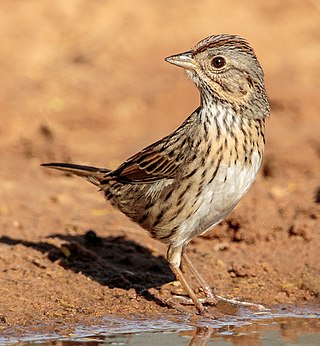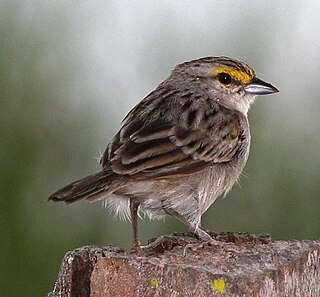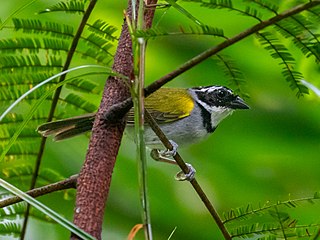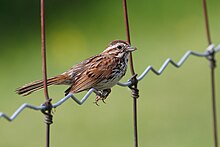
Old World sparrows are a group of small passerine birds forming the family Passeridae. They are also known as true sparrows, a name also used for a particular genus of the family, Passer. They are distinct from both the New World sparrows, in the family Passerellidae, and from a few other birds sharing their name, such as the Java sparrow of the family Estrildidae. Many species nest on buildings and the house and Eurasian tree sparrows, in particular, inhabit cities in large numbers. They are primarily seed-eaters, though they also consume small insects. Some species scavenge for food around cities and, like pigeons or gulls, will eat small quantities of a diversity of items.

The buntings are a group of Old World passerine birds forming the genus Emberiza, the only genus in the family Emberizidae. The family contains 44 species. They are seed-eating birds with stubby, conical bills.

The song sparrow is a medium-sized New World sparrow. Among the native sparrows in North America, it is easily one of the most abundant, variable and adaptable species.

The American tree sparrow, also known as the winter sparrow, is a medium-sized New World sparrow.

Pipilo is a genus of birds in the American sparrow family Passerellidae. It is one of two genera containing birds with the common name towhee.

The swamp sparrow is a medium-sized New World sparrow related to the song sparrow.

Lincoln's sparrow is a small sparrow native to North America. It is a less common passerine bird that often stays hidden under thick ground cover, but can be distinguished by its sweet, wrenlike song. Lincoln's sparrow is one of three species in the genus Melospiza which also includes the song sparrow and the swamp sparrow. It lives in well-covered brushy habitats, often near water. This bird is poorly documented because of its secretive nature and breeding habits solely in boreal regions.

A junco, genus Junco, is a small North American bird in the New World sparrow family Passerellidae. Junco systematics are still confusing after decades of research, with various authors accepting between three and twelve species. Despite having a name that appears to derive from the Spanish term for the plant genus Juncus (rushes), these birds are seldom found among rush plants, which prefer wet ground, while juncos prefer dry soil.

The genus Spizella is a group of American sparrows in the family Passerellidae.

Ammodramus is a genus of birds in the family Passerellidae, in the group known as American sparrows. Birds of this genus are known commonly as grassland sparrows. The name Ammodramus is from the Greek for "sand runner".

Passerculus is a genus of birds that belongs to the New World sparrow family Passerellidae. Currently it is considered to include just the Savannah sparrow.

Zonotrichia is a genus of five extant American sparrows of the family Passerellidae. Four of the species are North American, but the rufous-collared sparrow breeds in highlands from the extreme southeast of Mexico to Tierra del Fuego, and on Hispaniola.

New World sparrows are a group of mainly New World passerine birds, forming the family Passerellidae. They are seed-eating birds with conical bills, brown or gray in color, and many species have distinctive head patterns.

Arremon is a genus of neotropical birds in the family Passerellidae. With the exception of the green-striped brushfinch which is endemic to Mexico, all species are found in South America, with a few reaching Central America.

Arremonops is a genus of Neotropical birds in the family Passerellidae. All species are found in Central America, Mexico, and/or northern South America. The olive sparrow reaches southern Texas.

Atlapetes is a genus of birds in the New World sparrow family Passerellidae. The species are mainly found in montane forest from Mexico to northwestern Argentina.

Chlorospingus is a genus of perching birds, the bush tanagers, traditionally placed in the tanager family (Thraupidae). More recent studies which suggest they are closely related to the genus Arremonops in the Passerellidae. As of July, 2017, the American Ornithological Society assigns the genus to the new family Passerellidae, which contains the New World sparrows.

Peucaea is a genus of American sparrows. The species in this genus used to be included in the genus Aimophila.

Ammospiza is a genus of birds in the family Passerellidae, in the group known as American sparrows.


























